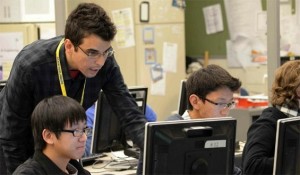 There are many ways to work in the field of education without holding a degree in education. Kindergarten through Secondary education requires a tremendously large work force. With that being said, most states have a process for obtaining a teaching license without holding the proper educational degree. Certification requirements for all 50 states can be found on this College of Education website. Those not interested in teaching, but desire the educational environment, retirement system and vacation schedule will be glad to know there are a variety of career options. Those with a Computer Science degree can work in school technology departments, or for educational cooperatives offering tech support and professional development on educational technology.
There are many ways to work in the field of education without holding a degree in education. Kindergarten through Secondary education requires a tremendously large work force. With that being said, most states have a process for obtaining a teaching license without holding the proper educational degree. Certification requirements for all 50 states can be found on this College of Education website. Those not interested in teaching, but desire the educational environment, retirement system and vacation schedule will be glad to know there are a variety of career options. Those with a Computer Science degree can work in school technology departments, or for educational cooperatives offering tech support and professional development on educational technology.
Educational Technology Specialists
Technology is now an absolutely integral part of the education field. The days of just asking for help getting the printer to work are long gone. Instructional technology is a booming field within education, and specialists that are tech savvy are needed to fill in the gaps. Even the U.S. Department of Education has an Educational Technology office. Classroom teachers are not expected to be technological gurus, but might need help getting up-to-speed on how to effectively utilize technology in their instruction. Those holding degrees in computer science will find their degrees to be welcomed in many school districts nationwide.
Related Resource: Computer Information Systems Manager
Non-Traditional Licensure
Many people obtain a degree in college only to find that their passions, goals and ambitions change over time. Finding the desire to work with young people as an educator may not come until after a degree has already been earned. To fill the need for classroom teachers coast-to-coast, states offer non-traditional licensure programs that can allow you to begin teaching without going through an all new degree program. These programs are generally rigorous and product excellent teachers. A computer science degree can still come in handy, as technology is such an integral part of instruction in today’s classrooms. Some have said that the non-traditional certification route to teaching is more rigorous and time consuming than a traditional teaching degree. These increased requirements for those wanting to enter teaching after they’ve obtained another degree are a testament to the high standards each state has to quality educators. Every state is different as to the requirements, so do your homework.
Computer Sciences and Education
With the strong emphasis on science and technology in the educational curricula today, a degree in computer cciences can be useful in a variety of ways. Those with a background in Information Technology (IT) are finding many employment opportunities helping establish and maintain the networks for public and private schools across the country. Others are proactive while still in college, and take courses to earn their teaching credentials along with their degree in Computer science. Regardless of if you are planning to teach in an area unrelated to computer science, or you want to provide non-instructional services within the technology area, opportunities definitely exist across the United States.